Curse of the Black Gold. 50 Years of Oil in the Niger Delta
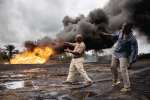 This book, released in 2008, gives an extremely deep and easily accessible insight into the conditions that prevail in this oil-producing region. The powerful photos by Ed Kashi succeed to catch the dreadful social and political situation in the South of Nigeria. Several essays by well-established writers look at the issue from diverse perspectives. Read excerpts and see photos of this strongly recommended book here.
This book, released in 2008, gives an extremely deep and easily accessible insight into the conditions that prevail in this oil-producing region. The powerful photos by Ed Kashi succeed to catch the dreadful social and political situation in the South of Nigeria. Several essays by well-established writers look at the issue from diverse perspectives. Read excerpts and see photos of this strongly recommended book here.
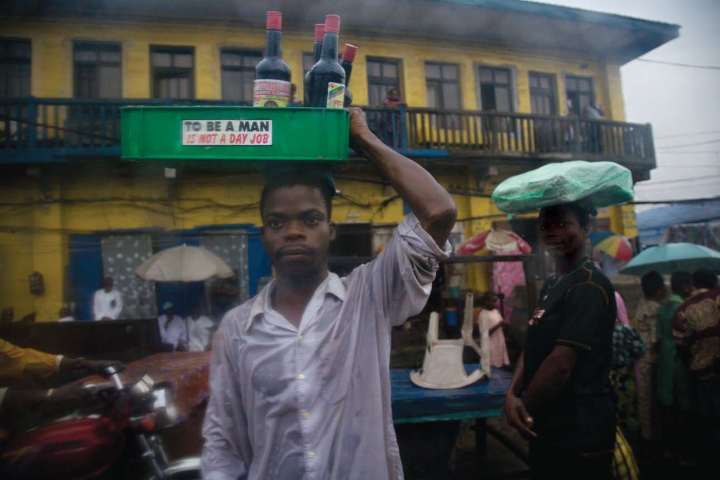
__________
Ed Kashi: Shadows and Light in the Niger Delta
Iraq led me to the Niger Delta. Actually, it was my work in Iraq that brought me to the attention of Michael Watts, a Berkeley-based scholar. For over thirty years, Michael has studied issues of oil and conflict, especially in regards to the Niger Delta. With Michael’s guidance, on my first trip to Nigeria in July 2004, my eyes and heart were opened and my anger and disgust were ignited. To tell this difficult, but profoundly important, geopolitical story in a visual way became an obsession.
The Delta is the pivotal point where all of Nigeria’s plagues of political gangsterism, corruption, and poverty seem to converge. In late 2005, I returned alone to continue the project and faced severe restrictions and frustrations. There were moments in Port Harcourt, lying in a dark, hot, mosquito-infested room, when I wondered if I could continue to see beyond my own weaknesses to overcome the seemingly insuperable obstacles that challenged me at every turn.
…
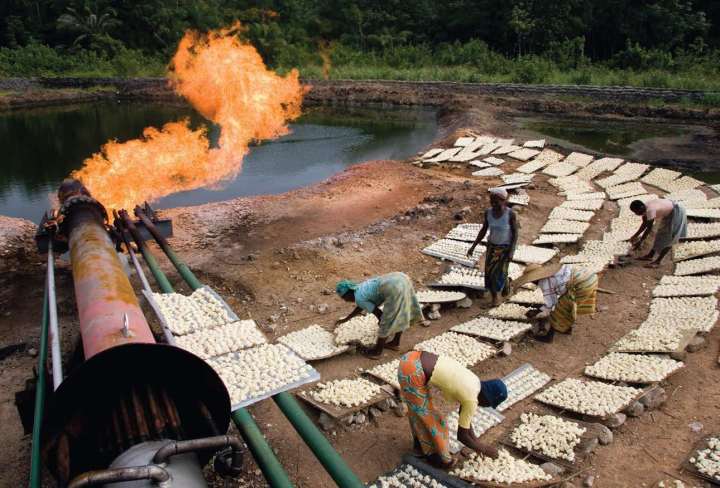
__________
Michael Watts: Sweet and Sour
…
Oil is, in other words, a natural resource and a commodity—perhaps the mother of all commodities. It happens to be the fuel of our modern, turbo-charged hydrocarbon capitalism and an item of exchange capable of yielding unimaginable wealth (“black gold”). In the long march toward the modern world system, mass commodities of various sorts—sugar, silver, slaves, palm oil, petroleum—have been its beasts of burden. They have come to serve not only as markers for entire epochs—the Era of Slavery, the Age of Oil—but enter the world market bearing the hallmark of what Hanna Arendt once called “the original sin of primitive accumulation,” dripping with blood and dirt. The annals of oil, after all, are an uninterrupted chronicle of naked aggression and the violent law of the corporate frontier. Iraq was forged by this dreadful trinity of oil, empire, and markets.
Commodities define the modern history of the Niger Delta. The Delta was the “Oil Rivers” long before it became a global supplier in the world oil and gas market. Bonny Island, near the shores of the Bight of Biafra, was a slave port by the seventeeth century and later became a prosperous city-state exporting 25,000 tons of palm oil each year to a surging British industrial economy. One hundred and fifty years later it is home to a massive export terminal and one of the world’s largest liquified natural gas complexes. The great hulks of the Royal Niger Company moored in the estuaries of the Niger Delta in the nineteenth century—serving as consulate, treasury, hospital, prison and residence—were forerunners of the oil barges, the offshore platforms, and the massive Floating Production Storage and Off-Loading (FPSO) vessels that now populate the Delta mangroves and Nigeria’s coastal waters.
Mass commodities with their blood and dirt still attached have always provided the Niger Delta’s point of entry into a world economy, its calling card to the capitalist cosmos. If the commodity is what Karl Marx called the economic cell form of capital, oil is a perfect expression of contemporary capitalism’s most basic genetic material. Oil’s power as a commodity in the market derives form its twofold identity. It comes first with its usefulness—its expediency—and then with its price tag. Both seem straightforward and unambiguous but price, and the pricing of oil, is mysterious, confusing, and bewildering, part of a world of appearances that obscures the operations of the system of which oil is part. Walter Benjamin, the great German critic, said that the commodity has a phantom-like objectivity. Commodities are not what they seem and for this reason are subject to all manner of mystification; they come with their own aura.
…

__________
Felix Tuodolo: Generation
…
Youth politics is now a major force to be reckoned with in the Niger Delta. Politicians ignore it at their peril; transnational corporations patronize it to secure their social license to operate; and community leaders accommodate its excesses to retain political office. Youth have become the voice of the people in all of its contradictory forms of expression. Youth movements are movements of rage, expressing long simmering resentments with which many citizens now strongly identify. Yet these generational conflicts are Janus-faced. One face points toward a thickening of civil society, the reform of stifling forms of customary rule, and the struggle for a new and true federalism. The other looks toward a world of disorder and violence. It is a world of mediocrity and venality, criminality and lawlessness. It entails a radical restriction of personal liberties and, alarmingly, a massive proliferation of armed violence.
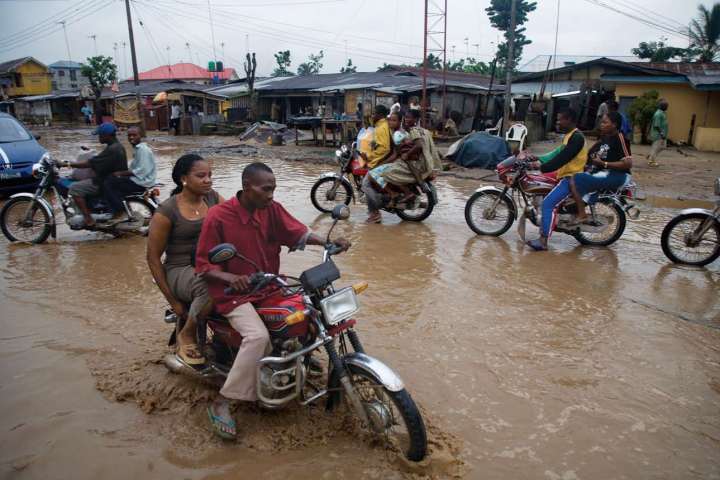
__________
Dimieari Von Kemedi: Nero’s Folly
…
Whether the rash of insecurity is due to criminality or a political cause—it is surely a mixture of both—what is clear is that the material conditions for rebellion clearly exist in the Niger Delta and that it was merely a matter of time before groups like MEND emerged to challenge the system. It is also clear that no security arrangements can guarantee stability in the region until the standard of living reaches a level that can make the people of the region see that life is beautiful.
Take for example David Independence. He is the first of eight children in his family. He qualified as an engineer 15 years ago but has been unable to secure a job. He stopped submitting applications more than 10 years ago when even his masters degree could not open doors for him. He feels especially bitter with the oil industry, which he believes has been hijacked by ethnic cabals within the oil industry. Ijaws, he believes, have been explicitly excluded by the industry, whilst creating the impression that qualified people like him do not exist. David rediscovered his sense of esteem and a source of living with a militia group that valued his expertise in remote detonation and mechanical improvisation. He died “at work,” leaving behind two potential militants.
David, like many young people in the Niger Delta, concluded that the deliberate deprivation of the Niger Delta has been a principle of state policy since Independence. The consequence has been deterioration of living standards and a dehumanization process that could only lead, like a Greek tragedy, to resistance and violence. Government’s response to resistance has, in turn, been a policy of systematic repression and state violence tacitly backed by the Nigerian elite, particularly since 1990.
…
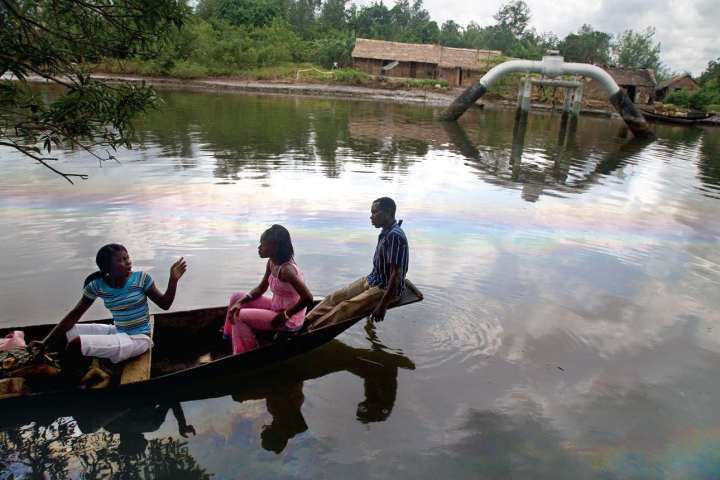
__________
All Contributors:
G. Ugo Nwokeji, Ph.D. is Assistant Professor of African-American Studies at the University of California, Berkeley. A historian of the black Atlantic, Professor Nwokeji has published widely on the Atlantic slave trade and its cultural, economic, and political consequences in Africa and the Americas.
Ukoha Ukiwo is an Oxford-trained political economist and a Research Fellow at the Center for Advanced Social Science in Port Harcourt. Previously a journalist with SUNRAY Publications, he has written extensively on ethnicity, politics, and democracy in Nigeria.
Nnimmo Bassey is a poet, novelist, and writer. He is currently the Executive Director of Environmental Rights Action/Friends of the Earth in Benin City, Nigeria.
Chimamanda Ngozi Adichie was born in Abba, Nigeria, in 1977. Her first novel, Purple Hibiscus, won the Commonwealth Writers’ Prize in 2003. Also the winner of the Orange Broadband Prize in 2007, her most recent work, Half of a Yellow Sun, recreates the Biafra War of the 1960s.
Felix Tuodolo recently completed his PHD from the University of Liverpool. He is a past President of the Ijaw Youth Council and a charter signatory, along with Ogoriba and Timi Kaiser-Wilhelm, to the Kaiama Declaration.
Ibiba DonPedro is the current editor of the National Point newspaper in Port Harcourt. One of Africa’s leading journalists, she was the recipient of the African Journalist Foundation’s Journalist of the Year Award in 2001, the Lorenzo Natali Prize in 2001, and the CNN African Journalist of the Year Award in 2003.
Oronto Douglas is a lawyer and environmental activist based in Port Harcourt. He was born and raised in Okoroba in the central axis of the Niger Delta and played a key role in the founding of the Ijaw Youth Council.
Kaine Agary grew up in Port Harcourt, Nigeria, which provided the setting for her first novel, Yellow-Yellow. She lives in Lagos, where she is the editor of TAKAii magazine.
Ledum Mittee is President of the Movement for the Survival of the Ogoni People (MOSOP), and in 2006, was elected President of the Unrepresented Nations and Peoples Organization (UNPO). He served as the co-defendant of Ken Saro-Wiwa during the military tribunal in 1995.
Dimieari Von Kemedi founded Our Niger Delta (OND) in 1997, one of the major civic groups devoted to conflict mediation and human development in the Niger Delta. Since 2007, he has served as Director General of Bayelsa State Due Process and e-Government Bureau, Yenagoa.
Thanks to Ed Kashi (edkashi.com) for admission to publish his photos here. The complete book can be downloaded at http://www.powerhousebooks.com/blackgold.pdf (8 MB). More information at http://www.curseoftheblackgoldbook.com/
leave a comment